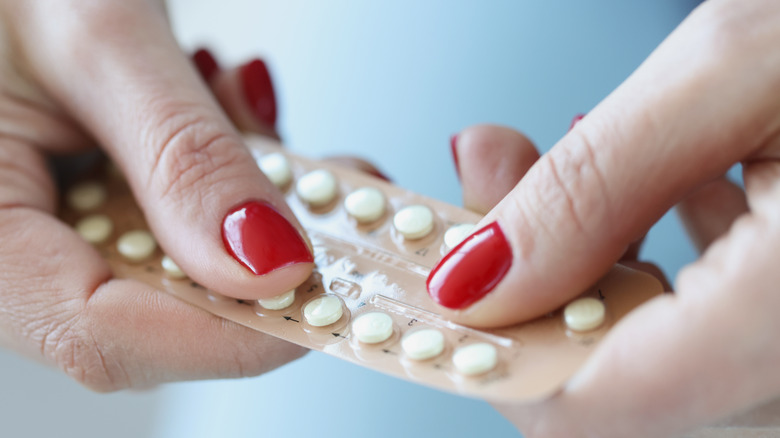Study Finds The Negative Effects Hormonal Birth Control Can Have On Teens
According to the Journal of Ethics, the Food and Drug Administration first approved the use of the hormonal birth control pill in 1960. The new option of taking a pill to avoid unwanted births caught on quickly and just two years after it was introduced, over 1 million American women were said to be taking the pill every single day. Its popularity never slowed down, with over 300 million women saying they have taken the pill at one point in their lives.
For all these years, the pill was deemed a safe way to not only avoid unwanted pregnancies but also to treat certain conditions like PCOS and PMDD, per Healthline. Parents trusted the pill so much that it became a popular thing to prescribe to teens who are thought to be sexually active, as well as those who experience terrible cramping during their periods, according to Kids Health. And while side effects like headaches, nausea, and sore breasts have always been known, they mostly disappear after your body gets used to the pill, a process which takes anywhere between two and three months, per Planned Parenthood. However, long-term effects, specifically ones that may affect an adolescent brain, have been widely unknown — until now.
A study on rats revealed some concerning effects of birth control
According to the National Library of Medicine, the birth control pill is the most commonly prescribed form of birth control currently on the market. But even with so many women taking the pill, there is so much we don't know about it. Recently, scientists at Ohio State University conducted a study to learn more about how the birth control pill may affect brain development.
As part of the research, young female rats were given the synthetic hormones found in birth control pills. It took only three weeks for scientists to begin to notice a change in the way the rats behaved, specifically when it came to communicating via their prefrontal cortex, which is responsible for our moods and behavior. The rats' level of corticosterone, the main stress hormone, also went up. But, what does this mean for humans?
Before you swear off birth control for yourself or your teen, it's important to understand that while these findings will help scientists understand the effects of birth control better, it does not mean that all young women will have long-term issues with their brain development and moods. According to Healthline, all humans can have a different reaction to the pill, with some experiencing mood swings and others not. In fact, the pill can actually help certain people with their mood swings, improving them or eliminating them altogether, per Web MD.
This study is a good first step, but there is so much more we need to learn about the pill before any blanket statements can be made regarding its effects on teens. As it stands, doctors recommend speaking with your provider to learn more and to determine if the risks outweigh the benefits of the birth control pill.

